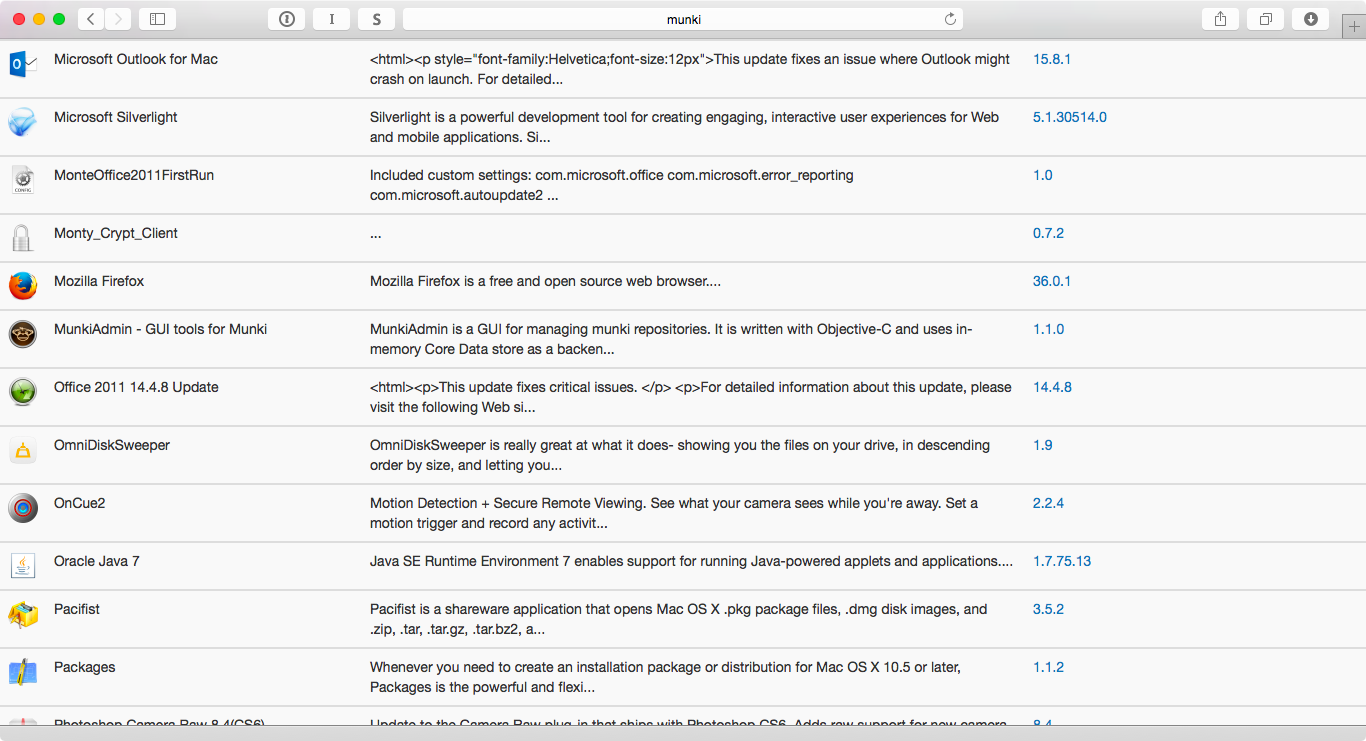Moscargo is a Munki(2) repo browser to aid in finding the most current version of the packages you curate, and makes them available for ad-hoc download, with the version number as the download link.
It's written in flask, loosely wrapped in bootstrap, and inspired greatly by Margarita. It was thrown together by a novice (me) very quickly, so it may very well not work for you. However, feel free to file issues with the understanding that I may not be able to (or honestly be interested in) do(ing) much more work on this, since more full-fledged solutions like Sal, MunkiWebAdmin, MunkiReport, and MunkiServer(among others) are available and staffed by more capable devs.
###How it does what it does: A bootstrap html template gets filled in with info from a python script. That script checks the 'all' catalog(you can change it in the script if you'd like to limit it to a specific catalog), generates a list of dictionaries for each item it finds (except for nopkg or Apple Update Metadata pkginfos, since those wouldn't have download links). It caps each description to the length of a tweet, and performs a set of checks to be able to make smart choices about icons:
- if it's a configuration profile(new in munki as of 2.2) it'll use a default image for that file type, (provided)
- if it has 'icon_name' set, it will use the designated icon
- if no 'icon_name' is set, it checks for a path in icons that has the short product name, and uses that if found
- if all else fails, it uses the (also provided) generic 'packages.png'
It then reverse-sorts this list of dict-per-catalog-entry by the version, creates a set to throw out duplicates (leaving the highest numerical version), and sorts again by name for ease of scrolling-lookup. (I could get fancier with bootstrap widgets and toolbars, but eff it, ship it. Maybe v.3)
To install, first check out or otherwise grab this code. I'd recommend setting up a virtualenv (using easy_install pip and then use pip to install virtualenv) wherever you'd like on the same server running your munki repo, and install flask as per their instructions. (If you use git and or git fat to sync around your repo, setting up a new web serving instance anywhere just for this purpose may make sense, too.) In the moscargo.py file, fill in the variable for the full path to the munki repo, and override the 'all' catalog if you'd like. cd into the included static folder and make symlinks (real ones on the command line, e.g.: ln /Users/Shared/repo/icons ./icons)pointing to your icons and packages folders. Optionally, modify the last line of moscargo.py as appropriate to meet your desired setup, if you want to limit to a specific IP for instance - see the flask docs for more info.
Test by first activating the virtualenv and running the moscargo.py file directly and navigate to http://localhost:5000. For better performance(you could be serving hundreds of megs on top of the regular munki repo load) and ease of 'prod' deployment, you may also want to use pip to install mod_wsgi, which is the simplest way I've found to get this running in Apache on a Mac with the included mos.wsgi script, it also leaves any pre-existing Apache config as-is. If all seems good, run the mod_wsgi-express script, preferably as a restricted service user and make sure that works as well, which would move it to port 8000 by default. (A launchd plist or other pleaserun method of init'ing the webservice is left as an exercise for you, see the Margarita and MunkiWebAdmin docs for some hints.)
In order to stand up a Docker container invoke Moscargo like this:
$ docker run -d -p 80:80 -v /path/to/munkirepo:/munki --name moscargo macadmins/moscargo
This will start the service (and possibly pull the image if you hadn't done so already) running on port 80. Feel free to substitute another port if needed (-p SOMEPORT:80). Moscargo will now be up with the Munki repo root path mounted from the host at /path/to/munkirepo onto /munki in the container. If you already have a running Munki repo container (let's call it munki-repo) that you want to use as Moscargo's full Munki repo path instead, invoke it like this:
$ docker run -d -p 80:80 --volumes-from munki-repo --name moscargo macadmins/moscargo
The Munki repo path used by Moscargo inside the container is set through the MOSCARGO_REPO environment variable which comes preset as /munki. There shouldn't be a need to change it, but if you need to for example because the path to the Munki repo mounted from another Munki repo container is different, you can set it at run time like so:
$ docker run -d -p 80:80 --volumes-from munki-repo -e MOSCARGO_REPO=/munkirepo/path --name moscargo macadmins/moscargo
